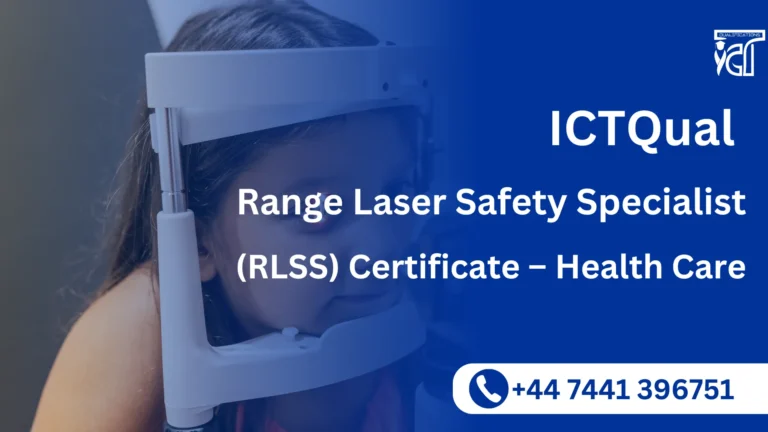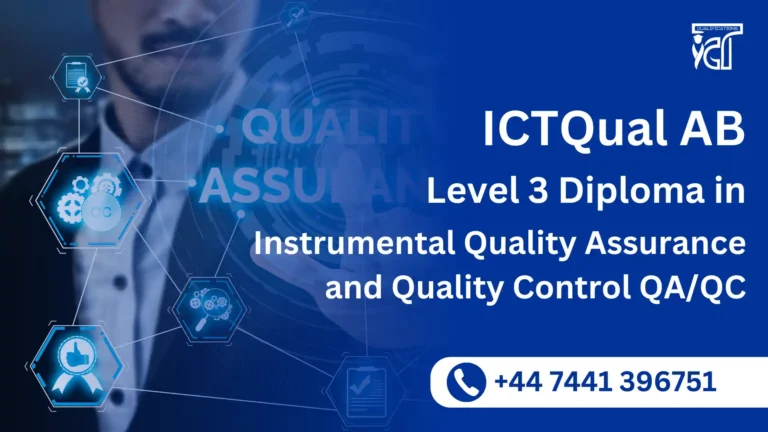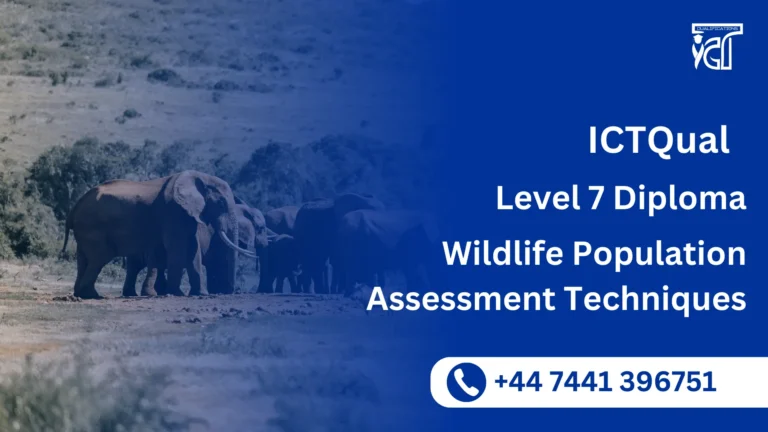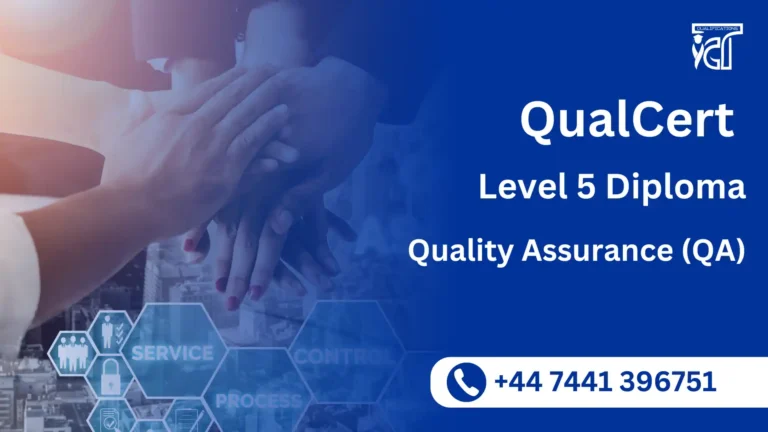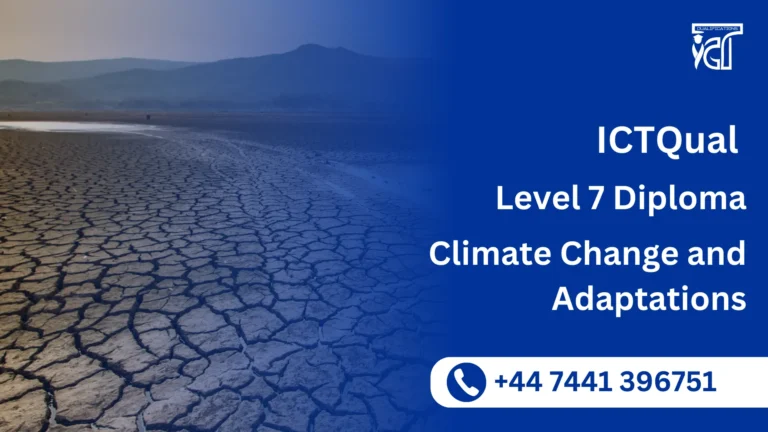The ICTQual AB Level 5 Diploma in QC Piping Inspector is designed to provide learners with a solid foundation in inspection and quality control practices for piping systems. This program equips participants with the essential knowledge and skills required to ensure safety, compliance, and reliability in industrial projects.
Learners will gain practical understanding of piping materials, welding processes, fabrication techniques, and basic nondestructive testing methods. The course introduces international codes and standards such as ASME, API, and ISO, enabling participants to apply recognized frameworks in inspection tasks across diverse industries.
Through structured study and applied learning, participants develop analytical abilities, problem‑solving skills, and confidence in conducting inspections. The program also emphasizes documentation, reporting, and ethical practices, preparing learners to contribute effectively to QA/QC teams and project environments.
By completing this diploma, learners enhance their career prospects in oil, gas, petrochemical, construction, and power generation sectors. The qualification serves as a pathway to supervisory roles, consultancy opportunities, and progression into higher‑level certifications in quality assurance and inspection.
ICTQual AB Level 5 Diploma in QC Piping Inspector
This qualification, the ICTQual AB Level 5 Diploma in QC Piping Inspector, consists of 6 mandatory units.
| Sr# | Unit Title |
| 1 | Construction QA for Process Piping Projects and Project Site Inspection |
| 2 | Evaluation of Welding Defects, Repair Criteria, and Re‑qualification |
| 3 | Quality Audit Techniques and Documentation Control in QC Systems |
| 4 | Supervisory Inspection Leadership and Team Coordination in QA/QC |
| 5 | Advanced Risk Management and Safety Compliance in Inspection Environments |
| 6 | Comprehensive Review of Piping Codes, Regulations, and Project Compliance |
Learning Outcomes for the Study Units:
Construction QA for Process Piping Projects and Project Site Inspection
- Learners design and implement construction quality assurance frameworks tailored to process piping installations.
- Learners conduct on-site inspection activities that verify installation compliance with engineering drawings and project specifications.
- Learners maintain and manage Inspection Test Plans (ITPs) and quality records that support project audit readiness.
Evaluation of Welding Defects, Repair Criteria, and Re-qualification
- Learners identify and classify welding defects (e.g., cracks, porosity, incomplete fusion) using standard acceptance criteria.
- Learners assess whether defects require repair or re-qualification based on codes and fracture mechanics-based evaluations such as Engineering Critical Assessment.
- Learners document findings and determine repair strategies in alignment with contractual and code requirements.
Quality Audit Techniques and Documentation Control in QC Systems
- Learners implement quality audit procedures, including internal inspections, process reviews, and corrective/preventive actions (CAPA).
- Learners apply document control processes to ensure traceability and regulatory compliance.
- Learners facilitate continuous improvement through audit findings and quality system refinement.
Supervisory Inspection Leadership and Team Coordination in QA/QC
- Learners coordinate and lead inspection teams during fabrication and onsite operations.
- Learners allocate inspection tasks effectively and ensure consistent application of inspection protocols.
- Learners mentor junior personnel in inspection methodologies and QA/QC documentation practices.
Advanced Risk Management and Safety Compliance in Inspection Environments
- Learners assess quality and safety risks, prioritising inspection focus based on hazard exposure.
- Learners devise risk mitigation strategies that align with inspection planning and safety compliance.
- Learners monitor inspection outcomes and update QC protocols to maintain project safety and integrity.
Comprehensive Review of Piping Codes, Regulations, and Project Compliance
- Learners interpret relevant international piping and welding codes (e.g., ASME B31.3, API standards, ISO QA frameworks).
- Learners evaluate inspection practices against regulatory obligations and contractual stipulations.
- Learners update inspection methodologies in line with evolving code revisions and industry best practices.
The ICTQual AB Level 5 Diploma in QC Piping Inspector is designed to strengthen learners’ technical knowledge and inspection skills, providing a strong foundation for career growth in quality control and compliance. This qualification supports both personal development and organizational excellence in industries where safety and reliability are critical.
Technical Knowledge and Skills
- Solid understanding of piping materials and fabrication processes
- Knowledge of welding inspection techniques and quality assurance practices
- Familiarity with nondestructive testing (NDT) methods for basic inspection tasks
- Ability to interpret technical drawings and specifications accurately
- Awareness of international codes and standards such as ASME, API, and ISO
- Skills to identify defects and recommend corrective measures
Career Development Opportunities
- Enhanced employability in oil, gas, petrochemical, construction, and power generation sectors
- Eligibility for entry‑level to mid‑level inspection and QA/QC roles
- Recognition as a qualified professional with industry credibility
- Opportunities to progress into supervisory positions or specialized inspection roles
- Competitive advantage in securing roles in international projects
- Pathway to further professional certifications and higher‑level diplomas
Professional Skills Growth
- Improved analytical and problem‑solving abilities for inspection challenges
- Strong documentation and reporting skills aligned with industry standards
- Development of communication skills for effective teamwork and compliance reporting
- Confidence in applying inspection procedures under pressure
- Ethical decision‑making and accountability in quality control practices
- Adaptability to diverse industrial environments and project requirements
Organizational Impact
- Contribution to operational safety by ensuring piping systems meet compliance standards
- Support for efficient project execution through reliable inspection practices
- Reduction of risks and costly failures by detecting issues early
- Strengthening of organizational credibility through adherence to international standards
- Promotion of continuous improvement within QA/QC frameworks
The ICTQual AB Level 5 Diploma in QC Piping Inspector is designed for learners who want to strengthen their technical knowledge and inspection skills in piping systems. This program is suitable for individuals aiming to build a career in quality control or progress into mid‑level inspection roles across diverse industries.
Professional Background
- Individuals with prior exposure to piping, welding, or mechanical inspection
- Professionals working in oil, gas, petrochemical, construction, or power generation sectors
- Candidates already engaged in QA/QC roles seeking to expand their expertise
- Learners with knowledge of fabrication processes and industrial safety practices
- Inspectors aiming to gain recognition through international standards and certifications
- Technicians seeking career progression into supervisory or mid‑level inspection positions
Skills and Competencies
- Basic understanding of piping systems and welding techniques
- Ability to interpret technical drawings and specifications
- Familiarity with nondestructive testing (NDT) methods and inspection procedures
- Competence in applying codes and standards such as ASME, API, and ISO
- Effective communication and documentation skills for reporting inspection outcomes
- Problem‑solving mindset to address inspection challenges in industrial environments
Learning Goals and Attributes
- To gain advanced knowledge in inspection and quality control methodologies
- To enhance career prospects by qualifying for mid‑level inspection positions
- To develop confidence in applying international standards across diverse industries
- To strengthen leadership potential for supervising inspection teams
- To prepare for further progression into higher‑level QA/QC qualifications
- To demonstrate dedication to safety, compliance, and organizational excellence
Completing the ICTQual AB Level 5 Diploma in QC Piping Inspector provides learners with a strong platform to advance their careers and pursue higher qualifications. This diploma opens pathways to supervisory roles, specialized certifications, and international opportunities, ensuring learners can continue building expertise in inspection and quality control.
Advanced Academic Pathways
- Progression to the ICTQual AB Level 6 Diploma in QC Piping Inspector for deeper technical mastery
- Opportunities to pursue specialized certifications in nondestructive testing (NDT) and welding inspection
- Access to advanced training in industrial safety, risk management, and compliance auditing
- Eligibility for international qualifications aligned with ASME, API, and ISO standards
- Pathway to continuous professional development through industry-recognized modules
- Expansion into multidisciplinary studies such as mechanical integrity and asset management
Career Development Opportunities
- Advancement into inspection and QA/QC supervisory roles across oil, gas, petrochemical, and construction industries
- Eligibility for mid‑level positions within QA/QC departments and project management teams
- Opportunities to work as independent inspectors or third‑party compliance specialists
- Recognition as a qualified professional trusted in global markets
- Increased employability in international projects requiring certified inspectors
- Potential to transition into consultancy or training roles for junior inspectors
Global Opportunities and Industry Impact
- Access to international career prospects in regions with high demand for QC inspectors
- Participation in cross‑border projects involving complex piping systems
- Eligibility for roles in multinational corporations and engineering consultancies
- Opportunities to collaborate with global inspection bodies and certification agencies
- Expansion into industries such as renewable energy, marine engineering, and power generation
- Establishment of a long‑term career pathway with global recognition and sustainability
Entry Requirements
Learners must meet the following criteria to be considered for admission into the course:
- Age Requirement: Minimum age of 18 years at the time of enrollment
- Educational Background: Completion of secondary school education or equivalent technical qualification
- Work Experience: No prior industry experience required. Suitable for school leavers, career starters, or individuals seeking their first technical qualification in inspection and quality control
- English Language Proficiency: Basic to intermediate command of English for reading course materials, preparing reports, and participating in discussions (CEFR A2–B1 or equivalent recommended)
Register Now
Qualification Process
Qualification Process for the ICTQual AB Level 5 Diploma in QC Piping Inspector
- Self-Assessment:
Begin by evaluating your eligibility to ensure you meet the qualification requirements, including work experience, knowledge, and language proficiency. - Registration:
Complete your registration by submitting the required documents, including a scanned copy of a valid ID, and paying the registration fee. - Induction:
An assessor will conduct an induction to confirm your eligibility for the course and explain the evidence requirements. If you do not meet the criteria, your registration will be cancelled, and the fee will be refunded. - Assignments & Evidence Submission:
Provide all assignments and the necessary evidence based on the assessment criteria outlined in the course. If you are unsure of the required evidence, consult with the assessor for guidance on the type and nature of evidence needed. - Feedback and Revision:
The assessor will review your submitted evidence and provide feedback. Evidence that meets the criteria will be marked as “Criteria Met,” while any gaps will be identified. You will be asked to revise and resubmit if needed. - Competence Evidence:
Submit final evidence demonstrating that all learning outcomes have been met. This evidence will be marked as “Criteria Met” by the assessor once it is satisfactory. - Internal Quality Assurance (IQA):
The Internal Quality Assurance Verifier (IQA) will review your evidence to ensure consistency, quality, and compliance with standards. - External Verification:
The IQA will submit your portfolio to ICTQUAL AB External Quality Assurance Verifiers (EQA) for final confirmation. The EQA may contact you directly to verify the authenticity of your evidence. - Certification:
Upon successful completion of all checks, ICTQUAL AB will issue your official certificate, confirming that you have attained the ICTQual AB Level 5 Diploma in QC Piping Inspector


